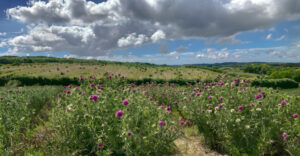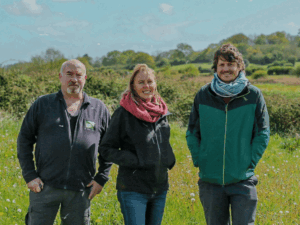Current land ownership isn’t working too well
“Land ownership in Britain is highly concentrated and unequal: just 1% of the population own half the land in England, while in Scotland just 432 landowners own 50% of the private land. This isn’t only an issue of social and economic inequality; it also poses major problems for transforming the way we use land in order to address the climate and nature crises.” Guy Shrubsole – Who owns England?
State of Nature
Dynamic content – same as first para of Funding nature
Right to Roam
The mental and physical benefits of access to nature and green spaces is clearly documented. Despite this, we the public are allowed access to only 8% of English land. Of the 92% of land we are excluded from, only 6% is built on, and 56% farmed. So that’s a lot of land that’s not feeding us or providing a home or business premises, which we are kept out of.
Even worse, we are allowed access to only 3% of English rivers.
50% of English land is owned by 1% of its population. Meanwhile, 1 in 8 families have no access to a garden, and in Tower Hamlets, London, 40% of families have no garden.
Recommended reading:
Rebirding: Restoring Britain’s Wildlife by Benedict Macdonald
Rewilding: The Radical New Science of Ecological Recovery by Paul Jepson and Cain Blythe
The Book of Trespass: Crossing the Lines that Divide Us by Nick Hayes
The Trespasser’s Companion by Nick Hayes
Who Owns England?: How We Lost Our Land and How to Take it Back by Guy Shrubsole
We believe that communities make better custodians of land.
Better custodians of land
As current land ownership isn’t working well, we believe that part of the solution is to get as much land as possible in the caring and sharing custodianship of communities. By this we mean owned by charities or not for profit organisations set up to manage and care for land for people and nature. These range from:-
- Large national charities like the RSPB, the National Trust and the Woodland Trust
- Smaller specific interest charities like the Amphibian and Reptile Conservation Trust
- Local charities like the Wildlife Trusts
- Community benefit societies, cooperatives and community land trusts
We don’t believe that we can trust our government to look after our land in the long term. From the Thatcher government selling off school playing fields, to the Conservative government trying to sell off our forests, to the numerous other examples of our land quite literally sold from under us – the government has proved itself a poor custodian. We could be forgiven for thinking that it has quite literally sold off our family jewels to foreign investors, in that our water companies are now owned predominantly, not just by foreign companies but even by foreign governments, leading to a monumental and catastrophic lack of investment in our water systems and ecological death of our rivers.
How to do it?
We need to help communities to prepare and be ready to act when land comes on the market.
We want to share here tips and sign posts to information.
In the meantime, here’s some starting points:
- Check if any charities are already interested in buying the land or can be persuaded to buy it with community support. Rewilding Britain and your local Wildlife Trust often have their finger on the pulse and so are a good place to start.
- If the answer is no – check if there are any existing community groups already interested in buying the land or who can be persuaded to buy it with community support.
- If no, and you still want to go for it and you don’t have any existing organisation you will need to set one up. That takes time and that’s something that often isn’t available. You may need to see if someone will take on putting an offer in while you get your organisation set up.
- Choosing the right organisation is key. Options include:-
- Charity
- Community benefit society
- Land cooperative
Sorry, that’s as far as we’ve got. We’ll be back to add more soon.


